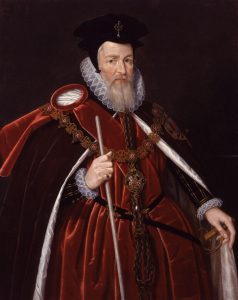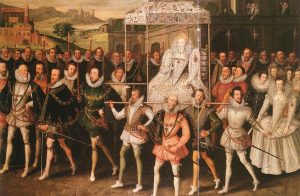England in 1558, Society and Government
The England that Elizabeth inherited in 1558 faced problems. Financially, Government was in crisis. Large debts had built up over the course of previous reigns. This meant that expenditure would need to be carefully managed. Society was going through a number of changes, such as the Reformation, which also impacted on Elizabeth’s rule from the off.
Government in Elizabethan England
The monarch was seen to have a right to rule by the Grace of God. That is, they had been chosen by god to rule. This commonly held view made the monarch the pivotal role in Government. It was they who made all of the main decisions. Elizabeth inherited a system of government designed to assist monarchs fulfil their duties. A small group of advisors, called the Privy Council, worked closely with the monarch. They were chosen by the monarch and had influence. However, as they were people of the monarchs choosing, along with the belief in the right of the monarch to rule, this sometimes led to the council not questioning a monarchs judgement: it could be very unwise to do so!

There was a senior Privy Councillor with the title Secretary of State. This person was the closest confidant of the monarch and worked with them on the most important matters.
A Parliament did exist in Elizabethan times. Elections could take place but it was common for the Privy Council to choose MPs. Only landowners could be an MP. Most candidates were unopposed. Parliament had to pass things into law so whilst the monarch could make decisions, MPs had the right to debate and vote on them. Parliament was called by the monarch to vote on matters. New taxes were voted on in Parliament.
Laws that were created as a result of the Monarch, Privy Council and Parliament working in that way were then enforced across the land. Each county had a Lord Lieutenant. They acted as the monarchs representative in each region. As such they looked after governing the county, local law enforcement and defence. They were supported by Justices of the Peace.
External Link: Privy Council
Society in Elizabethan England
Elizabethan England was mainly rural. Most of the population lived in farming villages and were engaged in jobs relating to this. Towns were expanding though. Trades were becoming more established and expanding export markets encouraged growth.
Society remained deeply religious. Everybody was expected to attend church on a Sunday. England was still undergoing a period of religious change though. The Split with Rome, caused by Elizabeth’s father, Henry VIII, wanting to marry Elizabeth’s mother, Anne Boleyn, had triggered a great schism. The Church in England had previously been led by the Papacy, in Rome. Following Henry’s divorce, it operated with the monarch as head of the Church of England. Additionally there was a split in peoples views on how to worship. The Protestant Reformation was underway in England and saw different points of view causing huge problems. Mary I had been known as ‘Bloody Mary’ for the persecution of protestant worshippers. Elizabeth though was a Protestant herself. This meant another change in approach and potential for unrest.
Culture
Theatre was extremely popular during Elizabethan times. People enjoyed comedies, tragedies, mysteries and history plays. There were several very well known playwrights. William Shakespeare was at his peak during Elizabeth’s reign and his work was both popular and influential. Other famous playwrights of the period include Christopher Marlowe and Ben Johnson. It was during Elizabeth’s reign that the first purpose built theatres were constructed in England. Previously they had tended to be in open spaces like courtyards or town squares. Some plays and a large number of poems were studied in Elizabethan Schools.
Elizabeth’s reign coincided with the Renaissance and though most works of the great artists of the day were from mainland Europe, the developments certainly had an influence in England.
Holidays and Leisure
There are numerous religious festivals in a year. In Elizabethan times these were widely celebrated. Alongside these were annual festivals to celebrate the Queens accession and traditional events such as the May Day celebrations. Games and sports were played at many of these festivals. Jousting was still popular with the upper classes. Other popular sports included Animal Sports such as Bear baiting or dog fights.
Links: British History – Tudors (KS2)


